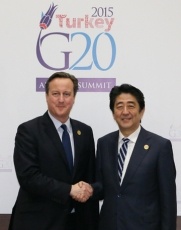Japan-United Kingdom Relations
Japan-U.K. Summit Meeting
 (Photo: Cabinet Public Relations Office)
(Photo: Cabinet Public Relations Office)
 (Photo: Cabinet Public Relations Office)
(Photo: Cabinet Public Relations Office)
On November 15, commencing at 7:10 p.m. (local time) for approximately 40 minutes, Mr. Shinzo Abe, Prime Minister of Japan, who is in Antalya, the Republic of Turkey to attend the G20 Summit, held a Japan-U. K. summit meeting with the Rt Hon David Cameron MP, Prime Minister of the U. K.. The overview is as follows.
1. Opening Remarks
(1) Prime Minister Abe expressed his condolences regarding British nationals injured by the recent terror attacks in Paris and stated that these acts were an assault against the values that Japan and the United Kingdom share and seek to protect. Prime Minister Cameron responded by expressing his gratitude for the words of sympathy regarding those injured by the terror attacks, and stated that both Japan and the United Kingdom were victims of terrorism and should fight against it together. The two leaders affirmed that they would collaborate closely and carry out counter-terrorism measures.
(2) Prime Minister Abe hoped that Japan and the United Kingdom should exercise leadership in addressing various issues facing the international community, such as thoroughly upholding the rule of law, which is of great importance to both countries. He also stated that he was looking forward to welcoming Prime Minister Cameron to the G7 Ise-Shima Summit next year.
(3) In response, Prime Minister Cameron commented that Japan and the United Kingdom are strong partners in areas such as economics and security, and expressed his hope to strengthen this partnership. He also mentioned that he was looking forward to the G7 meeting to be hosted by Japan.
(4) Prime Minister Cameron presented Prime Minister Abe with a surprise gift of a rugby ball with his sign “to celebrate the Brave Blossoms who made rugby history,” as well as a national flag that was used in the match between Japan and South Africa during the Rugby World Cup,
2. Bilateral Relations and Japan-EU Relations
(1) Prime Minister Abe expressed his gratitude to the United Kingdom for supporting the Legislation for Peace and Security that was established in September, and stated his intention to advance cooperation between Japan and the United Kingdom in the field of security and defense towards the next “2+2” meeting. Prime Minister Abe also mentioned that approximately 1,000 Japanese companies operating in the United Kingdom employ 140,000 people, and expressed his hope that the United Kingdom would support Japanese companies in their efforts to make further contributions to the United Kingdom in areas such as nuclear power plants and high-speed railways. In addition, Prime Minister Abe requested cooperation from the United Kingdom for reaching an agreement in principle on the Japan-EU Economic Partnership Agreement (EPA), and commented on the importance of concluding the Japan-EU Strategic Partnership Agreement (SPA) at an early date.
(2) Prime Minister Cameron stated that the bilateral economic partnership between Japan and the United Kingdom was at a very high level, and that he welcomed and supported the activities of Japanese companies in the United Kingdom. Prime Minister Cameron also agreed that Japan-EU EPA negotiations should continue and expressed the United Kingdom’s strong support for them.
3. Situation in East Asia
(1) Prime Minister Abe explained the situation in the East China Sea and South China Sea, and stated that the international community needed to cooperate and respond to this situation based on the perspective of the rule of law. In this context, Prime Minister Abe stated that in accordance with this perspective, Japan supported the recent “Freedom of Navigation Operations” by the United States Navy.
(2) In response, Prime Minister Cameron pointed out the importance of incorporating China into a rule-based and transparent system.
4. Others
Prime Minister Cameron stated that the Japan shares values with the United Kingdom such as democracy, rule of law, and free market economy, and that there were huge mutual investments between the two countries. He stated that as Japan’s position in the international community is important, Japan should be a permanent member of the United Nations Security Council. The two leaders also affirmed that Japan and the United Kingdom would collaborate and cooperate in the field of cybersecurity.

